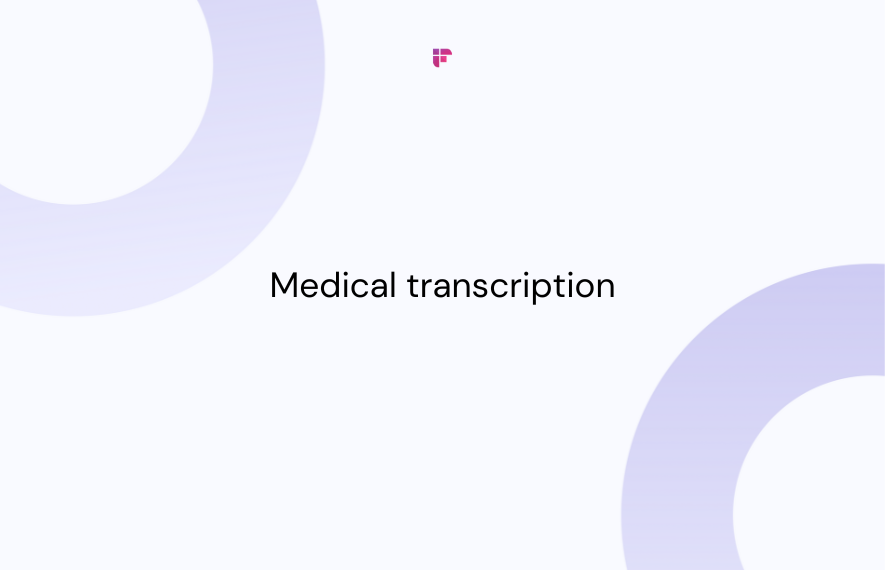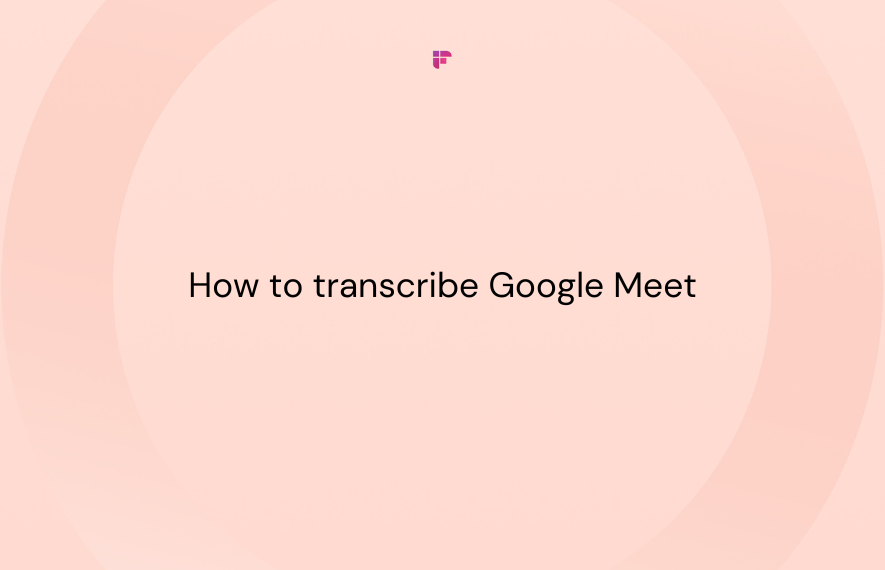Busy medical professionals rely on accurate and timely documentation of patient visits. However, dictating notes and managing their transcription takes time away from patient care.
This is where medical transcription comes in.
This article explores what medical transcription is, how much transcriptionists earn, and how you can automate it.
Let’s begin!
What is medical transcription?
Medical transcription is an essential process in healthcare that ensures the accurate documentation of patient’s medical records. These records serve as a comprehensive collection of an individual's medical history, including their symptoms, health experiences, examination and test results, and proposed treatment plans.
Medical transcription helps create accurate, complete, and timely medical records that support effective patient care and proper administration within the healthcare system.
What does a medical transcriptionist do?
Medical transcriptionists, or medical language specialists, play a crucial role in translating healthcare providers' audio recordings or handwritten notes into organized and legible documents. They actively listen to and type notes to create accurate transcripts, clarify inconsistencies with the provider, and submit the medical records to the hospital’s electronic health record (EHR).
By doing so, medical transcriptionists help maintain the integrity and completeness of medical records, vital for continuity of care and effective communication among healthcare providers. Inaccuracies or omissions in these records can potentially affect insurance coverage or lead to misdiagnosis and inappropriate treatment.
Furthermore, medical transcriptionists ensure the documentation complies with legal requirements and industry standards. They must maintain the confidentiality of sensitive patient information and adhere to privacy regulations, such as the Health Insurance Portability and Accountability Act (HIPAA).
What skills are required to be a medical transcriptionist?
You might wonder what skills it takes to be a medical transcriptionist. It's not just about typing speed; it's about truly hearing and understanding the nuances of healthcare professionals' dictations.
Let’s explore the key skills and demands for becoming a medical transcriptionist:
- Medical knowledge: Transcriptionists are experts in medical terminologies, enabling them to decipher and transcribe the technical language healthcare providers use.
- Listening skills: Adept at close and careful listening, transcriptionists capture nuanced details in dictation, interpret accents, and maintain focus amid distractions.
- Written communication: Exceptional grammar and editing skills to transform dictated information into cohesive, readable documents, adhering to style guidelines for precise health record documentation.
- Technical proficiency: Navigating audio playback tools and electronic health record (EHR) software, transcriptionists demonstrate unparalleled proficiency across essential healthcare platforms.
- Time management: Efficiently handling high dictation volume, medical transcriptionists balance speed and accuracy, navigating tight timelines.
By completing a medical transcription program, transcriptionists can enhance their credentials with certifications like Certified Healthcare Documentation Specialist (CHDS) or Registered Healthcare Documentation Specialist (RHDS).
Medical transcriptionist salary
As per Glassdoor, the median annual wage for medical transcriptionists was $57,547 in November 2022. Now, while the overall employment trend might be on a decline, there are still around 8,100 job openings projected each year. That's because healthcare professionals consistently need skilled individuals to ensure accurate documentation.
Save costs and automate medical transcription with Fireflies.ai

AI notetakers like Fireflies.ai are becoming popular to automate clinical documentation with speed and accuracy and save costs, especially when the use of medical transcriptionists is on a steady decline.
Fireflies is HIPAA compliant, which means it follows strict regulations to ensure the privacy and security of protected health information (PHI). It upholds healthcare data privacy through:
Secure data storage: Fireflies offers private storage in the location of your choice. You also have the option to bring your own storage for maximum oversight.
BAAs with vendors: Fireflies has signed BAAs (Business Associate Agreements) with its vendors, prohibiting them from using PHI for AI training or storing it on their servers.
Admin controls: Fireflies allows admins to control who has access to meeting data, granting authorized personnel the right level of access.
Employee training: Fireflies trains all employees in data privacy and security, which helps to ensure that the company is constantly improving its practices and staying up-to-date with the latest security measures.
Encryption: Fireflies uses 256-bit AES and 256-bit SSL/TLS encryption to protect data during transmission and storage.
Fireflies is also SOC 2 Type II and GDPR compliant.

Benefits of Fireflies.ai for healthcare organizations include:
- Improve patient care as physicians can focus more on conversations rather than taking notes
- Reduce burnout and save cost by automatically transcribing consultations with over 90% accuracy
- Save time by integrating with the EHR system using Zapier or Fireflies API
- Ask questions, get insights, generate follow-up appointment emails and more with our GPT-4 powered chatbot AskFred
- Comprehensive summaries with timestamps, simplifying insights extraction and patient follow-ups
💡 Fireflies: Your new medical transcriptionist!
Directly upload previous medical recordings to Fireflies, integrate Fireflies into virtual consultations, or record on the go with our mobile app for the ultimate convenience.






![How to Download YouTube Subtitles [The Easiest Way]](/blog/content/images/size/w1000/2024/05/Copy-of-Meeting-etiquette-rules-all-professionals-must-follow---2024-05-02T130226.505.png)
![7 Top Speech-to-Text Chrome Extensions for Effortless Transcription [Free & Paid]](/blog/content/images/size/w1000/2024/04/Meeting-etiquette-rules-all-professionals-must-follow--15--1.png)